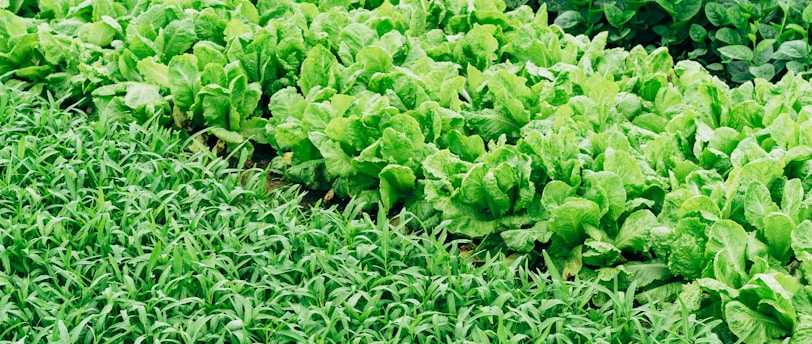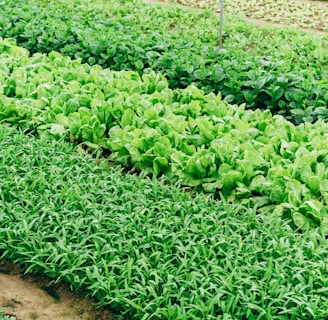Top 10 Profitable Crops to Grow in Nigeria (and How to Get Started)
Agriculture is the backbone of Nigeria’s economy, employing millions of people and contributing significantly to food security. With the right knowledge and approach, farming can also be one of the most profitable ventures in the country. Whether you’re a new farmer, an investor, or someone curious about agribusiness, knowing the most profitable crops to grow in Nigeria can give you a head start. In this guide, we’ll explore the top 10 profitable crops in Nigeria and provide practical tips on how you can get started with each one.
8/1/20253 min read


1. Cassava
Cassava is one of Nigeria’s staple crops and a key ingredient in popular foods like garri, fufu, and starch. Beyond local consumption, cassava has multiple industrial uses, including ethanol production, animal feed, and flour.
Profit Potential: High. Nigeria is the world’s largest producer of cassava, yet demand still exceeds supply.
Start-Up Tips:
Plant improved varieties from research institutes like IITA.
Cassava grows well in loamy soils with good drainage.
Processing into garri or flour increases profit margins.
2. Rice
Rice is a highly consumed food in Nigeria, especially during festive periods. Despite local production, Nigeria still imports millions of tons yearly, leaving a huge market gap.
Profit Potential: Very high due to strong demand.
Start-Up Tips:
Secure irrigated farmland for year-round production.
Invest in modern rice milling machines for value addition.
Explore government initiatives like the Anchor Borrowers’ Programme for funding.
3. Maize (Corn)
Maize is not only a staple food but also a raw material for industries producing poultry feed, alcohol, starch, and snacks. It is fast-growing and suitable for small-scale and large-scale farmers alike.
Profit Potential: Medium to high depending on scale.
Start-Up Tips:
Grow hybrid maize seeds for higher yield.
Apply proper fertilizer and pest management.
Sell to breweries, feed mills, and local markets.
4. Soybeans
Soybeans are in high demand because they are used in animal feed, cooking oil, soy milk, and baby food. Nigeria still imports large quantities to meet demand.
Profit Potential: Growing fast due to its use in livestock feed.
Start-Up Tips:
Plant improved early-maturing varieties.
Ensure good soil fertility with proper crop rotation.
Target livestock feed companies as bulk buyers.
5. Palm Oil
Palm oil is known as “red gold” because of its profitability. It’s used in cooking, cosmetics, and even biofuel production. Nigeria has vast potential for palm oil farming but still imports from Malaysia and Indonesia.
Profit Potential: Extremely high if cultivated and processed well.
Start-Up Tips:
Invest in hybrid palm seedlings that produce faster and yield more oil.
Processing into bottled, refined palm oil fetches higher returns.
Consider export markets for long-term growth.
6. Groundnuts (Peanuts)
Groundnuts are loved across Nigeria and can be eaten raw, roasted, or processed into oil, butter, and flour. They are also great for intercropping with maize or cassava.
Profit Potential: High because of multiple uses.
Start-Up Tips:
Grow in sandy-loam soil with good drainage.
Invest in quality seeds to avoid aflatoxin contamination.
Target industries that produce groundnut oil and snacks.
7. Vegetables (Tomatoes, Pepper, Okra, Ugu, etc.)
Vegetable farming is one of the fastest ways to make money in Nigeria’s agriculture sector because of their short maturity period. Tomatoes and peppers are always in demand across households and restaurants.
Profit Potential: High but requires careful handling (perishables).
Start-Up Tips:
Use greenhouse or irrigation farming for off-season profits.
Apply organic manure for healthier and tastier produce.
Supply directly to markets, supermarkets, and hotels.
8. Cocoa
Cocoa is one of Nigeria’s most valuable export crops. Though it requires patience (3–5 years before first harvest), it can generate income for decades.
Profit Potential: Very high for long-term investors.
Start-Up Tips:
Plant improved hybrid cocoa seedlings.
Shade trees and pest management are crucial for high yield.
Explore export channels through cooperatives and associations.
9. Plantain
Plantain is widely consumed and can be processed into chips, flour, or baby food. It requires minimal maintenance and can be intercropped with other crops.
Profit Potential: Medium to high.
Start-Up Tips:
Use sucker multiplication techniques to expand quickly.
Sell fresh produce or process into plantain chips for added value.
Establish contracts with restaurants and supermarkets.
10. Ginger
Nigeria is one of the top producers of ginger in the world, and the spice is highly valued both locally and internationally. Ginger is used in food, medicine, and cosmetics.
Profit Potential: High due to export potential.
Start-Up Tips:
Focus on organic ginger for premium pricing.
Dry and package ginger for higher profit margins.
Connect with international buyers through export associations.
How to Get Started in Crop Farming (Beginner’s Guide)
Now that you know the most profitable crops to grow in Nigeria, here are some practical steps to help you start:
Choose the Right Crop
Consider demand, profitability, and your available resources.
Start small and scale up gradually.
Secure Land and Resources
Select fertile land with good access to water.
Lease if you can’t buy outright.
Get Quality Seeds/Seedlings
Source from reliable agro-dealers or research institutes.
Avoid roadside seeds to prevent poor yield.
Learn Basic Farming Practices
Take training from local agricultural extension officers.
Join a farming cooperative for mentorship and support.
Focus on Value Addition
Don’t just sell raw produce—process and package to increase profits.
Example: maize → pap flour; cassava → garri, starch, or chips.
Market Your Produce
Sell directly to consumers, supermarkets, restaurants, and industries.
Explore online platforms and social media for wider reach.
Leverage Government and Private Support
Take advantage of programs like CBN’s Anchor Borrowers’ Programme.
Partner with NGOs and agritech startups for funding and training.
Conclusion
Farming in Nigeria is not only about growing food; it is about tapping into a billion-dollar industry that supports livelihoods and creates wealth. From cassava and rice to ginger and cocoa, the opportunities are endless. The key is to start small, learn continuously, and scale wisely.
If you are serious about agribusiness, choosing any of these top 10 profitable crops and applying the right strategies can set you on the path to success.
